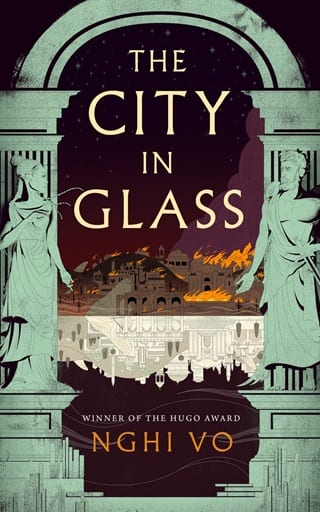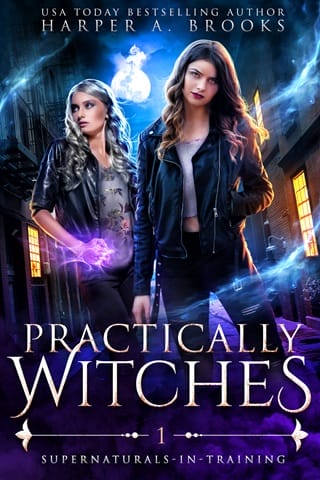Chapter Nineteen
NINETEEN
In the end, she didn’t choose, instead writing all their names in her book. They grew, one or two died, and the rest thrived in the streets and courts of the new Azril. More than once, Vitrine came across the angel hurrying after this one or that, sitting at a lawyer’s elbow as she argued, keeping a drunken mercenary captain from tumbling into the river.
“I’m not doing anything wrong,” he said before she could speak, and Vitrine covered a smile.
“You’re not doing anything right, either. That one’s a worse murderer than Alex could ever have dreamed of being.”
The angel looked perhaps a bit abashed, and Federico Lorca walked on, unaware of the demon and the angel on the bridge behind him.
“I knew him when he was small,” the angel muttered. “He was sweet then.”
“He’s sweet now, if you ignore the dead and the ones who loved them. You have grown strange in the past years, angel.”
“I have not. I am not meant to change.”
Alex had said the same thing, but it would be, Vitrine thought, cruel to bring him up. Alex had died the summer before, and the angel was more sensitive to such things than she was. Instead she hoisted herself up to sit on the bridge’s stone balustrade, dangling her bare feet over the rushing of the river water.
“It wouldn’t be so bad, would it?” she asked over her shoulder, and the angel regarded her warily. Still those same old robes. So dull.
“It’s inevitable,” she continued. “I had to learn it the hard way. I’m still learning.”
“And here I thought you knew everything.”
She made a face, turning to gaze at the river. They were preparing for Summersend again, though they called it by a different name. Paper lanterns lit up the banks, and bits of song drifted to them over the lapping water.
“Compared to you, I do.”
He came to stand beside her, and the distance between them was less than it had been in the previous decades. It struck her that they were both older than they had been, a rare concept for something as everlasting as they were.
“Is this what it was like before?”
“Do you think I will forgive you if it is?”
His laugh was short and sharp, the humorless bark of a desert dog.
“I know better than to wish for the moon to return to the earth.”
“Then what?”
“I only wish to know. Was it this bright, this loud? What does that book of yours say?”
She hesitated, pressing her hand to the center of her chest, and then, almost without quite understanding why she would do such a thing, she pulled out her book. She found the page almost immediately, her finger skimming over the lines as she read out loud.
Someone has started the tradition of setting little paper boats on the water, painted with wax and set alight. Every year, they sail flaming down the river, clustered together before they sink to trouble the catfish and the turtles. They say that if your ship makes it to sea, you will have your fondest wish before the end of the year. They seldom make it past the Third Bridge, let alone gain the harbor, but still they are beautiful.
This year, the boats became snagged on the body of a drowned girl, foundering on her skirts, trapped by her hair. I took her back to Calliope’s to be treated decently, poor thing, and she told me as they slip-stitched her lips and her eyelids shut that her wish was that whoever pushed her in should be pushed in themselves.
I was having such a good time, she told me. I wish I could have stayed a little longer.
Next year, I will have lanterns lit along the banks to call the people out. There will be musicians and food vendors, whores, thieves, those up too late and those who have awakened to see what the matter is. Next year, there will be a thousand little boats carrying a thousand wishes to the harbor, and I will put two in the water for her, one for the death of her murderer and one for her good rest among the reliquaries of Old Rooster, who ministers the unlucky dead.
Next year, there will be such light.
She closed the book again, gazing out over the river. She should bring back the feast of the boats, lanterns along the river, wishes traveling to sea.
“I made it bright and loud,” Vitrine said. “Before me, was silence.”
A low voice carried back to them on the wind, Federico’s. He had stopped only a short way up the river, and now he stood on one of the stone piers, singing in a rumbling baritone of the faithful girl and the faithless moon. Somewhere across the river, a light tenor answered him, the faithful moon, the faithless girl.
“Tell me something?” the angel asked.
“If I want to.”
“What have I done here? How much of this city is mine?”
Apparently Vitrine was still capable of a red rage, and there was no separation between hearing the question and her hand darting out to grab the angel by his ragged collar and pitch him into the water with an almighty splash. He came up sputtering with surprise, and she snarled down at him.
“None of it!” Vitrine shouted. “Do you hear me, none of it is yours! It’s mine, and it has nothing to do with you!”
It was a lie, and she knew it even before she said it, and she thought, watching the smile flicker over the angel’s lips by the shattered light from a dozen lanterns, that he knew it too.
On the banks, a pack of children shouted with laughter at seeing someone go into the drink, and they poled their raft to him. When they reached him, however, he was gone, and they sent up a panicked shout at how he might have drowned so fast.
On the bridge above, Vitrine snorted, walking back to the riverbank. Of course there was no argument he could make, and she followed Alex’s drunken son until he found his way back home.
There were a few restful decades after that, and then one rather terrible set of years where a religious mania took the city, breaking the windows and burning the old luxuries. Vitrine gritted her teeth and dealt with it, because such things happened sometimes. The angel stood by with a worried look on his face, because it had as much and as little to do with him as it did with her, and more than once, she caught him staring in shock around him. Still, he held his tongue and so did she, and the bad years passed, followed by the founding of a scriptorium and a university. Azril’s reputation for learning and for beauty returned, as well as its reputation for decadence and sex.
Another dozen years, and someone came up with a technique for bleaching stone. Now all the towers that they reared up in the city were white, gleaming, and gorgeous, and in Vitrine’s chest, her book bristled with new names. Sometimes she still saw the ghosts of old Azril, but they were happier now, and anyway, they would have been long dead long ago.
One day, watching as Alex’s great-granddaughter’s fleet left the harbor for distant Sui, Vitrine felt the angel’s wings flutter in her chest. She pressed her hand between her breasts, calming them the way she had become accustomed to doing, and she paused, counting.
It had been some three hundred years, she guessed, since. She was never good with numbers. Still, three hundred years was a long time for an angel or a demon. She wasn’t in the business of forgiving, but changing, that she could do.
The angel approached her where she stood on the quay.
“There’s a unicorn at the market,” he said without preamble. “Doan is trying to buy it for the university.”
Doan was another one of Alex’s descendants. The angel kept better track than she did.
“A unicorn?”
“Yes,” he said with some asperity. “The merchant who brought it in has drugged it, or it would have killed half the square by now.”
“Oh, I should go see,” Vitrine said, and she followed him off the beach.
 Fullepub
Fullepub 



